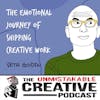Listener Favorites: Seth Godin | The Emotional Journey of Shipping Creative Work

Seth Godin tackles the emotional journey of shipping creative work. He shares his incredible insight that will help you navigate this journey from wherever you are to wherever you need to be.
We are joined by Seth Godin, prolific author, entrepreneur and former business executive, for yet another fascinating conversation. This time, Godin tackles the emotional journey of shipping creative work. He shares his incredible insight that will help you navigate this journey from wherever you are to wherever you need to be.
Subscribe for ad-free interviews and bonus episodes https://plus.acast.com/s/the-unmistakable-creative-podcast.
Hosted on Acast. See acast.com/privacy for more information.
Candid Conversations: Elevate Your Thinking with Masters of Their Craft
Dive into a realm of transformative conversations, where wisdom from trailblazers who've shattered norms is at your fingertips. Learn from best-selling authors who've decoded productivity, and thought leaders who've sculpted the landscape of personal and professional growth. Unearth the secrets of successful entrepreneurs, delve into the science of habits, and explore the art of charisma. Each conversation is a journey, brimming with unexpected insights and practical wisdom that will ignite you











